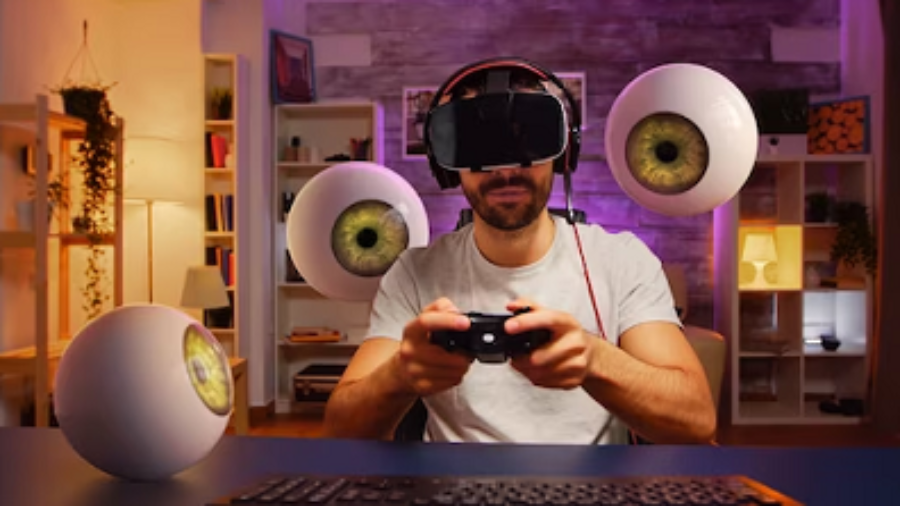
Image Source: Unsplash
RephraseIn today’s digital age, video games have become an intricate part of our lives. As enthusiasts immerse themselves in virtual worlds and embark on numerous quests, the impact of video games on mental health has become a topic of interest and concern. This article delves into the delicate balance between the benefits and risks associated with video game consumption, shedding light on its potential impact on mental well-being.
The Benefits of Playing Video Games
While video games have received criticism regarding mental health, it is prudent to acknowledge benefits. A prime advantage is sharpened problem-solving and critical thinking. As individuals navigate intricate challenges and hurdles in games, their capacity for critical reasoning and innovative solutions strengthens. This refined faculty impacts not just the virtual realm, but real world scenarios favorably as well. Games requiring perspective taking and multistep logic lend themselves well to strengthening skills applicable elsewhere. Considerations of both potential upsides and downsides yield a fuller picture than focus on either in isolation. A balanced view recognizes gaming may suitably harness higher-order cognition when engaged with judiciously.
Achieving success in video games can foster feelings of accomplishment and boost self-esteem. Conquering challenging objectives or achieving lofty scores allows players to feel proud and satisfied. For those who may lack confidence in other life domains, video games offer a venue to succeed and cultivate self-esteem. Through their gameplay, individuals experience triumph and build belief in themselves. Complex tasks completed and high ranks reached provide evidence of capabilities, serving to bolster assurance wherever it is lacking.
Additionally, video games are able to encourage social involvement and communication as well. Multiple player games specifically cultivate teamwork and collaboration between gamers. This could result in the formation of solid social bonds and relationships. At a time when in-person interactions are starting to become more restricted, video games provide people with a means to connect and take part with others, even if it’s within a virtual environment.
The Potential Risks of Playing Video Games
Though video games present various advantages, it is essential to consider potential hazards linked to overuse. One key issue involves video game dependency. Comparable to other addictions, people can become reliant on the virtual environments provided by video games. This reliance can result in disregarding real-world duties like schooling, employment, and relationships. It is crucial to identify addiction warning signs and seek assistance if needed.
Studies have also connected extensive video game involvement to social detachment. Spending copious time playing video games can potentially diminish live social exchanges. This may bring about emotions of isolation and separation from reality. It is crucial to find equilibrium between virtual participation and sustaining relationships in true life.
Research has also indicated a possible link between extensive video game play and higher incidence of depression and anxiety. Though the precise connection remains under investigation, it is prudent to monitor one’s mental state and seek expert assistance when required. Finding equilibrium between video gaming and pursuits that nourish overall welfare is paramount.
Understanding the Relationship Between Video Games and Mental Health
To fully grasp the impact of video games on mental health, it is necessary to understand the underlying mechanisms at play. Video games often provide an escape from reality, allowing individuals to immerse themselves in virtual worlds. This escapism can be both positive and negative. On one hand, it can provide temporary relief from stress and anxiety. On the other hand, it can lead to a disconnection from reality and an avoidance of real-life challenges.
Whether video games positively or negatively impact mental health depends on the messages conveyed within each game. Games containing excessive violence or overstimulation risk enhancing aggression and impulse control. Individuals, especially parents, would benefit from discerning each game’s content and considering how it may affect well-being. A balanced perspective is warranted, as research on this complex issue remains ongoing.
The Role of Moderation in Video Game Usage
Whether enjoying video games or any other form of entertainment, moderation is important. Setting boundaries around video game time can assist with balancing virtual involvement and other parts of life. Real-world duties should take priority over extensive gameplay. Responsibilities like work, relationships, and personal well-being need to come before too many hours in front of a screen. Finding equilibrium allows fully experiencing life’s various rewarding aspects.
Establishing a schedule and sticking to it can be beneficial in ensuring that video games do not take precedence over other important aspects of life. Additionally, taking regular breaks during gaming sessions and engaging in physical activities can help minimize the potential negative impact of video game usage on mental health. It is crucial to find a balance that allows for both the enjoyment of video games and the fulfillment of real-life obligations.
Rephrase
Suggestions for Keeping a Steady Equilibrium Among Video Game Participation and Other Pursuits
Rephrase
Finding equilibrium between video game time and other pursuits is fundamental for comprehensive mental health. Consider some suggestions to accomplish this equilibrium:
Rephrase
- Establish defined boundaries when playing video games: Set precise time restrictions for gaming and adhere to them. This will help guarantee that other significant parts of life are not overlooked.
- It is important to handle real-life duties first before dedicating time to video games. Make certain to fulfill work, school, and relationship obligations prior to indulging in game play. Taking care of responsibilities
- Pursuing different activities can help create a balanced lifestyle with less reliance solely on virtual engagements. Make time for other hobbies and interests beyond video games. This approach allows you to broaden your experiences and dedicate periods to discovering what else may interest you. A well-rounded routine incorporating diverse interests can help foster an engaging and fulfilling daily life.
- Connecting with others in meaningful ways is important. Make time for real-world interactions and relationships outside of online spaces. Engage in activities together face-to-face with friends and family, and focus on quality conversations. Cherish social bonds and the people in your life.
- Practice self-care: Take breaks during gaming sessions to rest and recharge. Engage in physical activities, practice mindfulness, and prioritize self-care to maintain a healthy mindset.
Recognizing Signs of Video Game Addiction and Seeking Help
Rephrase
Being overly engaged with video games is a genuine worry that deserves attention. It is crucial to identify the telltale indications and manifestations of addiction and search for assistance if necessary. Some regular signs of being too reliant on video games encompass spending an excessive amount of time engrossed in games instead of other important activities in life, becoming irritable or moody when attempting to reduce gameplay, lying to others about how much one games, having tried unsuccessfully to reduce gaming time, and continuing to game
Rephrase
- A strong fixation on engaging with video games frequently
- Failing to properly attend to real world duties including one’s job, education, or relationships due to excessive time spent playing video games
- Ceasing gameplay can sometimes induce unpleasant physical or emotional responses in devoted video game players. When lacking access to Unsuccessful efforts to diminish
- Turning to video games as a way for individuals to divert their attention from difficult feelings or high-stress life events. Some may find that immersing themselves
For individuals struggling with an unhealthy dependence on video games or those close to such persons, seeking guidance from an addiction specialist is strongly advised. Therapists and counselors with experience in dependencies can offer direction, encouragement and approaches to surmount addiction and build a more balanced relationship with gaming. Their help navigating this issue provides an evidence-based path forward.
The Positive Impact of Video Games on Mental Health
While video games do pose risks if consumed excessively, they can benefit mental health in moderation. As noted, games help develop problem-solving and thinking skills, raising self-esteem. They offer social interaction too. Games also relieve stress and let creativity emerge. Finding balance allows harnessing these upsides while avoiding downsides.
In addition, video games have demonstrated usefulness as therapeutic devices in some situations. The application of game components in nongaming contexts, otherwise known as gamification, has exhibited potential in domains like mental health care and recovery. For instance, virtual reality games have assisted people in conquering phobias and controlling anxiety.
The Negative Impact of Video Games on Mental Health
When considering video games, it is prudent to weigh both the potential upsides and downsides. Though games can provide entertainment and engagement with others, overuse brings real risks to one’s well-being. Too much time with video games alone can result in harmful dependence, disconnecting a person from real social bonds and potentially deepening feelings of sadness or worry. Moreover, games centered around violence or highly exciting scenarios may possibly encourage more aggressive or uncontrolled behaviors in some. Moderation and balance are key – while games can offer fun, making them the sole or dominant focus of one’s leisure brings costs to overlook.
Maintaining equilibrium between engaging with video games and other pursuits that cultivate overall wellness is essential. By establishing boundaries, placing real world responsibilities as a priority, and involving oneself in a diverse selection of pastimes, people can reduce any likely unfavorable influence gaming may have on mental health.

In conclusion, achieving equilibrium between the advantages and hazards of video games on psychological well-being is important. While certain games may provide cognitive benefits, excessive engagement can potentially undermine mental health.
To summarize, video games have an intricate bond with psychological well-being. Although they can present noteworthy intellectual advantages, boost self-assurance, and motivate social communication, excessive involvement can guide to addiction, social disengagement, and augmented danger of mental health difficulties.
Achieving equilibrium between video game engagement and other facets of life is paramount to capitalizing on the upsides yet mitigating potential downsides. Establishing unambiguous parameters, assigning primacy to actual responsibilities, and involving yourself in an assortment of pursuits are pivotal to preserving a sound association with digital diversions.
When creating content for videos games, it is important to consider both the perplexity and burstiness of the text. Perplexity measures the complexity of the text, while burstiness assesses the variation between sentences. To engage readers and sound like a natural conversation, the content should have a good mix of longer, more complex sentences paired with shorter, simpler ones. Transition words can help connect ideas in a smooth flow. Focusing on both perplexity and burstiness adds dimension and avoids repetitive structures. By tailoring the content in this way, readers will appreciate video games both as an entertaining form of interactive media and a mentally stimulating experience. With moderation and balance, video games can truly provide benefits to our well-being.





